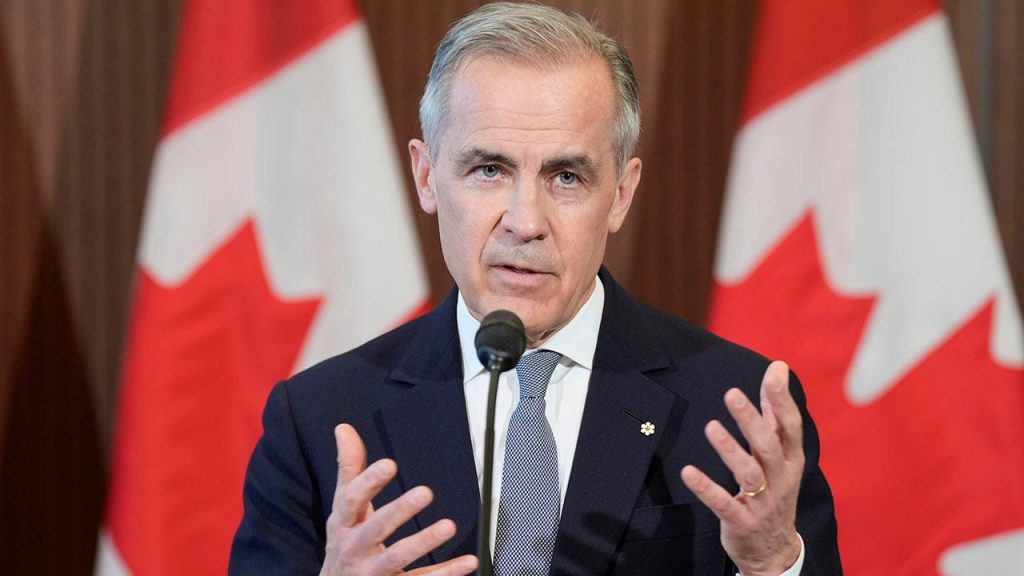In a significant shift in Canada-U.S. relations, Canadian Prime Minister Mark Carney recently declared that the longstanding relationship characterized by economic integration and military cooperation is no longer tenable. Speaking after a meeting with provincial premiers in Ottawa, Carney emphasized the upcoming necessity for a broad renegotiation of trade agreements, particularly in light of recent tariffs imposed by President Donald Trump. These comments come in the wake of Carney’s landslide victory for the Liberal leadership, where he secured 86% of the vote, illustrating a strong mandate as he navigates this complex diplomatic landscape.
| Article Subheadings |
|---|
| 1) The Changing Dynamics of Canada-U.S. Relations |
| 2) Carney’s Remarks on Trade Agreements |
| 3) Reactions to Trump’s Tariffs |
| 4) The Canadian Government’s Stance |
| 5) Key Takeaways from Carney’s Leadership |
The Changing Dynamics of Canada-U.S. Relations
The diplomatic relationship between Canada and the United States has undergone notable changes in recent years. Historically, the two nations have enjoyed a close partnership marked by cooperation in trade, security, and military matters. However, recent statements by Prime Minister Mark Carney suggest a reevaluation of this foundational connection. With Carney asserting that “the old relationship we had with the United States, based on deepening integration of our economies and tight security and military cooperation, is over,” it signals a significant departure from past policies. This shift indicates a new chapter in Canadian foreign policy as leaders respond to evolving global pressures and domestic expectations.
Carney’s Remarks on Trade Agreements
During his press conference in Ottawa, Carney highlighted the pressing need for Canada to reevaluate its trade relationships, especially with a focus on how Canada can renegotiate agreements following President Trump’s recent moves. The U.S.-Mexico-Canada Agreement (USMCA), which replaced NAFTA, was a product of intense negotiations under Trump’s administration. Carney’s remarks did not clarify the future of this agreement, which has political implications across North America. He stated, “The time will come for a broad renegotiation of our security and trade relationship,” underlining that the uncertainty created by the U.S. administration’s tariffs requires a proactive approach from Canada.
Reactions to Trump’s Tariffs
President Trump’s recent announcement to implement a 25% tariff on foreign-made cars aims to protect and boost the U.S. auto industry. Such tariffs have caused a ripple effect, unsettling Canadian leaders and igniting frustration among Canadian citizens. In response, Carney expressed that the actions taken by the U.S. underline a need for Canada to assert its own economic power. “What is clear is that we as Canadians have agency. We have power. We are masters in our own home,” he stated. This sentiment emphasizes a move towards self-reliance and economic sovereignty amidst external pressures, suggesting a paradigm shift in Canada’s approach to international relations. The Canadian government must navigate these challenges while reassuring citizens of their commitment to economic stability and social welfare.
The Canadian Government’s Stance
The Canadian government, under Carney’s leadership, appears committed to addressing the tensions arising from U.S. trade policies. Following Carney’s remarks, there were indications that the government aims to reassess its strategies and priorities concerning trade relations. Addressing the media, Carney noted the unclear future regarding U.S. actions and emphasized that Canadians must now adjust to a landscape where they control their economic destiny. This new rhetoric signals a robust strategy focused on resilience, asserting that Canada will not only respond to U.S. tariffs but will actively engage in negotiations that reflect Canadian interests and values.
Key Takeaways from Carney’s Leadership
With the first significant challenges faced by Prime Minister Carney, a leader recently regarded as an outsider in Canadian politics, come insights into his governance approach. His emphatic statements signify a desire to reshape Canada’s role on the world stage and assert autonomy in its international partnerships. Carney’s decisive language resonates with both provincial leaders and the Canadian populace, emphasizing the importance of national interests over historical ties. By framing the conversation around Canadian agency, Carney positions himself as a leader ready to defend Canadian economic interests actively. His remarks serve as a call to unite Canadians in recognizing their potential to navigate these challenging waters effectively.
| No. | Key Points |
|---|---|
| 1 | Prime Minister Mark Carney underscores a significant shift in Canada-U.S. relations. |
| 2 | Calls for renegotiation of trade agreements in light of U.S. tariffs. |
| 3 | Carney emphasizes Canadian economic sovereignty and agency. |
| 4 | The uncertain future of the USMCA remains a critical issue. |
| 5 | Carney’s remarks reflect a new direction for Canadian leadership. |
Summary
In conclusion, the recent statements made by Canadian Prime Minister Mark Carney reflect a profound reconfiguration of the Canada-U.S. relationship, prioritizing Canadian interests amidst external pressures. As the government seeks to renegotiate trade agreements, it underlines the importance of national sovereignty and economic resilience. The response to recent tariffs signifies a strategic pivot for Canada, encouraging a united approach towards fostering domestic strengths while navigating international challenges. Carney’s leadership trajectory promises to redefine how Canada engages on the global stage.
Frequently Asked Questions
Question: What are the implications of Carney’s declaration on Canada-U.S. relations?
Carney’s declaration signifies a shift in diplomatic strategy, prioritizing Canadian economic interests and suggesting a reassessment of existing trade agreements with the United States.
Question: How does the U.S. tariff on foreign-made cars affect Canada?
The tariff imposed by the U.S. can negatively impact Canada’s automotive industry, creating tensions and prompting Canadian policymakers to reconsider their trade strategies and negotiations.
Question: What leadership style is Carney demonstrating in his new role?
Carney is showcasing a decisive leadership style that emphasizes national sovereignty, agency, and a proactive approach to international diplomacy, marking a distinct shift from previous administrations.


